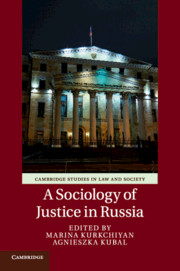Book contents
- A Sociology of Justice in Russia
- Cambridge Studies in Law and Society
- A Sociology of Justice in Russia
- Copyright page
- Dedication
- Contents
- Figures
- Tables
- Contributors
- Acknowledgements
- Chapter One Introduction
- Chapter Two The Professionalisation of Law in the Context of the Russian Legal Tradition
- Chapter Three To Go to Court or Not? The Evolution of Disputes in Russia
- Chapter Four The Everyday Experiences of Russian Citizens in Justice of the Peace Courts
- Chapter Five In Search of Justice
- Chapter Six When Business Goes to Court
- Chapter Seven Journalists, Judges and State Officials
- Chapter Eight Accusatorial Bias in Russian Criminal Justice
- Chapter Nine Decision-Making in the Russian Criminal Justice System
- Chapter Ten The Richelieu Effect
- Chapter Eleven Administerial Justice
- Index
- Cambridge Studies in Law and Society
- References
Chapter Nine - Decision-Making in the Russian Criminal Justice System
Investigators, Procurators, Judges and Human Trafficking Cases
Published online by Cambridge University Press: 27 June 2018
- A Sociology of Justice in Russia
- Cambridge Studies in Law and Society
- A Sociology of Justice in Russia
- Copyright page
- Dedication
- Contents
- Figures
- Tables
- Contributors
- Acknowledgements
- Chapter One Introduction
- Chapter Two The Professionalisation of Law in the Context of the Russian Legal Tradition
- Chapter Three To Go to Court or Not? The Evolution of Disputes in Russia
- Chapter Four The Everyday Experiences of Russian Citizens in Justice of the Peace Courts
- Chapter Five In Search of Justice
- Chapter Six When Business Goes to Court
- Chapter Seven Journalists, Judges and State Officials
- Chapter Eight Accusatorial Bias in Russian Criminal Justice
- Chapter Nine Decision-Making in the Russian Criminal Justice System
- Chapter Ten The Richelieu Effect
- Chapter Eleven Administerial Justice
- Index
- Cambridge Studies in Law and Society
- References
Summary
- Type
- Chapter
- Information
- A Sociology of Justice in Russia , pp. 205 - 230Publisher: Cambridge University PressPrint publication year: 2018
References
- 2
- Cited by



